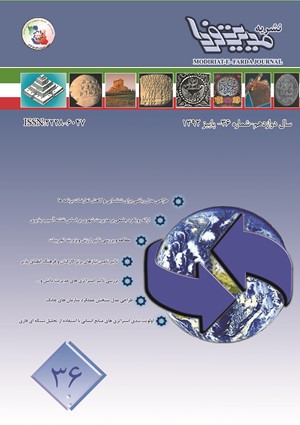طراحی مدلی ریاضی برای شناسایی و کاهش تعارضات برنامههادر سطح ملی مبتنی بر الگوی اسلامی-ایرانی پیشرفت
محورهای موضوعی :
1 -
کلید واژه: برنامهریزی تعارض الگوی اسلامی-ایرانی پیشرفت برنامهریزی چند معیاره,
چکیده مقاله :
برنامهریزی یکی از وظایف اصلی مدیریت است که همواره مورد توجه مدیران و سیاستگذاران بوده است. زمانی که برنامهریزی در مقیاسهای کلان مورد توجه باشد پیچیدگیهای خاصی متوجه فرایند برنامهریزی است که ممکن است منجر به بوجود آمدن تعارضات در برنامهها گردد. در این پژوهش تعارضات بین برنامهای مورد توجه قرار گرفته و تعارضات مابین برنامههای ملی با الگوی اسلامی-ایرانی پیشرفت بررسی شده است. منظور از برنامههای ملی برنامههایی است که توسط سازمانهای ملی تدوین شده و مورد استفاده قرار میگیرند. از آنجا که الگوی اسلامی-ایرانی پیشرفت یک سند بالادستی است که تمامی برنامههای ملی و سایر اسناد بالادستی باید در هماهنگی و سازگاری با آن تدوین گردند توجه به مسئله تعارض بین برنامههای ملی و الگو میتواند از اهمیت بالایی برخوردار باشد. مهمترین مسئله در رفع تعارض نگاه جامع برنامهریزان به تمامی ابعاد برنامهها است تا حتیالمقدور تعارضی واقع نگردد اما در برنامههای ملی به دلیل پیچیدگی و وسعت برنامهها وقوع تعارض اجتناب ناپذیر است. در این پژوهش مدلی براساس تکنیکهای برنامهریزی چند معیاره برای شناسایی و کاهش تعارضات در برنامههای ملی پیشنهاد گردیده و مزایای استفاده از آن مورد بحث واقع شده است.
Planning is one of the main functions of management and has always been the focus of managers and policy-makers. Planning at large scale levels involves complexities that can lead to conflicts among different national plans. In this study, the inter-plan conflicts between national plans and the “Islamic-Iranian advancement pattern” have been addressed. National plans are defined as plans designed by the national level organizations and being implemented by them. The “Islamic-Iranian advancement pattern” is an upper-hand document that all of the other plans must be designed in compatibility and adaptability with it; therefore the conflicts between “Islamic-Iranian advancement pattern” and other national plans are a remarkable and important issue. Also it should be noted that the most important point in preventing the conflicts is the comprehensive view of planners and also their expertise, but according to complexity of such plans the occurrence of conflicts is inevitable. In this study, a model based on the multi-criteria decision making methods for the determination and reduction of the conflicts in national plans has been introduced and also the advantages of this model have been discussed.


